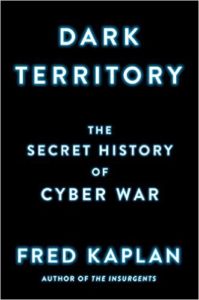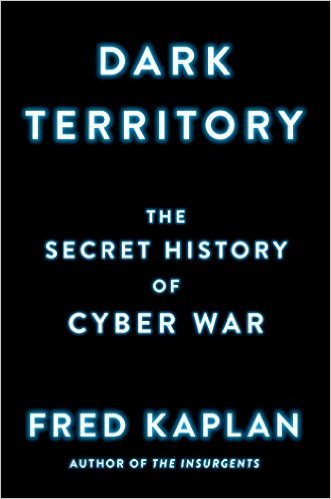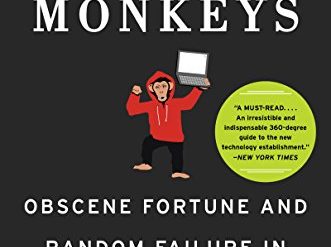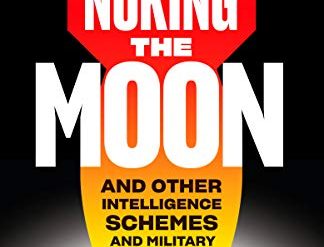
Occasionally, I come across a book on an important topic that’s crammed with information I was able to find nowhere else — but is a chore to read. Even though it is not an academic study but clearly intended for a general audience, Fred Kaplan’s recent history of cyber war, Dark Territory, is one such book.
Estimated reading time: 6 minutes
A story stretching over five decades
Unlike previous treatments that I’ve read about the topic, which zero in on the vulnerability of the American economy to attacks through cyberspace, Dark Territory traces the history of our government’s slowly growing awareness of the threat, beginning nearly half a century ago. Then, a prescient Pentagon scientist wrote a paper warning about the dangers inherent in computer networks. Apparently, though, no one in a position to do anything about it paid much attention to him.
Dark Territory: The Secret History of Cyber War by Fred Kaplan ★★★☆☆
Kaplan identifies an incident fully fifteen years later in 1984 when President Ronald Reagan — a movie fan, of course — saw the film War Games. He queried the chairman of the Joint Chiefs of Staff at a top-level White House meeting whether it was possible for a teenager like the one portrayed in the film by Matthew Broderick to hack into sensitive Pentagon computers. When the chairman, General John Vessey, reported some time later that the feat was in fact possible, Reagan called for and later signed the government’s first policy directive on the topic of cyber war. But that, too, led to no significant change at the Pentagon or anywhere else in the federal government.
Dark Territory is filled with revealing anecdotes like this, based on what surely was top-secret information not long ago. Kaplan reveals many little-known details about the Russian cyber war on Estonia and Ukraine, the Chinese Army’s prodigious hacking of American corporations and the Pentagon, the massive North Korean assault on Sony, Iran’s disabling of 20,000 computers in Sheldon Adelson’s casino empire, and the successful US-Israeli attack on Iran’s nuclear infrastructure. Kaplan also reveals the reason why US complaints about China’s cyber attacks have fallen on deaf ears: it turns out that the National Security Agency is attacking the Chinese government in much the same way. As The Guardian revealed in 2013, “the NSA had launched more than 61,000 cyber operation, including attacks on hundreds of computers in Hong Kong and mainland China.”
Casting a harsh light on Bush II
The book casts a particularly harsh light on the Administration of George W. Bush. Bush, Cheney, Rumsfeld, and other senior officials in the early 2000s cavalierly dismissed urgent reports from national security and intelligence officials that the threat of cyber war, and the vulnerability of the US economy, were growing at an alarming rate. Only under Bush’s successor did reality strongly take hold. As Kaplan writes, “During Barack Obama’s presidency, cyber warfare took off, emerging as one of the few sectors in the defense budget that soared while others stayed stagnant or declined.”
It’s difficult to understand how anyone who was awake could have failed to grasp the problem. For example, a war game conducted in 1997 was intended to test the vulnerability of the Pentagon’s computer systems within two weeks. “But the game was over — the entire defense establishment’s network was penetrated — in four days. The National Military Command Center — the facility that would transmit orders from the president of the United States in wartime — was hacked on the first day. And most of the officers manning those servers didn’t even know they’d been hacked.”
16-year-old hackers
Not long afterwards, the Pentagon was hacked in a similar way by two 16-year-old boys in San Francisco. And when national security officials widened the scope of their attention to encompass the country’s critical civilian infrastructure, such as the electricity grid, they were shocked to discover that the situation was far worse. The Pentagon eventually bowed to the warnings and implemented needed security measures. But private corporations blatantly refused to do so because they didn’t want to spend the money — and Congress declined to allow the federal government to make security measures obligatory.
Unfortunately, Kaplan’s book is poorly organized. It’s roughly structured along chronological lines but jumps back and forth through time with such regularity as to be dizzying. And it’s crammed so full of the names of sometimes obscure government officials and military officers that it becomes even more difficult to follow the thread of the story.
However, these challenges aside, a picture clearly emerges from Dark Territory: For decades the American public has been at the mercy of incompetent and pigheaded people in sensitive positions in the government, the military, and private industry — and we still are. Bureaucratic games proliferate. Politics intrude. Inter-service rivalries abound. Personal grudges get in the way. Repeatedly, some of those who are entrusted with the security of the American people make what even at the time could easily be seen as stupid decisions.
Other takes on cyber war
Last year I read and reviewed a book titled Future Crimes: Everything Is Connected, Everyone Is Vulnerable and What We Can Do About It, by Marc Goodman. I described it as “the scariest book I’ve read in years.”
Five years earlier, I read Cyber War: The Next Threat to National Security and What to Do About It, by Richard A. Clarke and Robert K. Knake. From the early 1970s until George W. Bush’s invasion of Iraq, Clarke filled high-level national security positions under seven Presidents, so he knows whereof he writes. (He resigned in protest over the invasion of Iraq, which he thought distracted the government from the real threats facing the country.) Not long afterward, I read and reviewed Worm: The First Digital World War, by Mark Bowden, a much more focused treatment of the topic — a case study, really — but equally unsettling.
Though less current, all three of these books are better organized and more readable than Dark Territory. Admittedly, though, Kaplan’s book reveals the history that is only hinted at in the others.
About the author
Fred Kaplan wrote five previous books about the nuclear arms race and other topics bearing on US national security. He was on a team at the Boston Globe in 1983 that won a Pulitzer Prize for a series about the nuclear arms race.
For related reading
Previously, I reviewed two nonfiction books on related subjects:
- Cyber War: The Next Threat to National Security and What to Do About It by Richard. A. Clarke and Robert K. Knake, reviewed at An authoritative insider’s take on the threat of cyber war; and
- Future Crimes: Everything Is Connected, Everyone Is Vulnerable and What We Can Do About It by Marc Goodman, reviewed at The harsh truth about cyber security.
For a longer list of related books, go to Good nonfiction books about national security.
You might also be interested in seeing my post, 20 good nonfiction books about espionage.
You may also enjoy browsing through 20 top nonfiction books about history.
And you can always find my most popular reviews, and the most recent ones, on the Home Page.



























